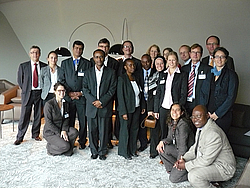
Strengthening the Marrakech Task Force (MTF) on Cooperation with Africa
PROMOTING AND IMPLEMENTING SUSTAINABLE CONSUMPTION AND PRODUCTION IN AFRICA
Sustainable Consumption and Production (SCP) has significant potential to make meaningful contributions to sustainable development on the African continent. In order to fully make use of this potential it is necessary to implement coherent and effective SCP programmes on the ground. This can be achieved by providing conclusive information and guidance on implementation processes and by building linkages and learning processes among central stakeholders.
Supporting SCP by developing linkages between the MTFs
Seven MTFs support countries in their efforts to green their economies through the implementation of SCP. Six of the task forces focus on key SCP issues such as Sustainable Lifestyles or Sustainable Buildings and Construction (SBC), the MTF on Cooperation with Africa aims to promote SCP more broadly within the regional context of Africa. The aim of the MTF on Cooperation with Africa is to assist African countries to integrate SCP into practical policy measures. To increase the efficiency of these activities the CSCP undertook the “Strengthening the MTF on Cooperation with Africa” project. The project fosters linkages between the regionally focussed MTF on Cooperation with Africa and the issue-focused task forces. Central outcomes of the project are three publications and several networking and knowledge sharing workshops attended by project partners, development agencies, experts and governmental representatives.
Guiding the implementation processes
In 2008, Mauritius, Tanzania, Egypt (Cairo) and Mozambique (Maputo) had already developed domestic support programmes to facilitate the implementation of SCP. Because of the success, these countries were chosen as pilot countries to explore mechanisms to further develop local SCP programmes. To support this aim, the CSCP produced the document “Making SCP Happen – Implementation Plan for SCP programmes in Africa”. The document serves as a guideline for the efficient implementation of SCP activities in the African context. On the basis of research findings on principles and instruments for implementing government or municipal SCP incentives, the document emphasises the living character of the implementation processes. To disseminate the research findings the document was distributed to decision makers in the pilot countries to guide future SCP activities.
Facilitating linkages and learning
To support the wider implementation of SCP programmes it is necessary to initiate learning processes and to replicate best practice examples. Therefore, the visibility of SCP activities in the pilot countries and regions plays a fundamental role in the project. “National and Regional Action Plans on Sustainable Consumption and Production in Africa” is a booklet that meets this need by encouraging the creation of partnerships between the pilot countries/cities and other organizations/regions. The booklet highlights the current status of projects, priority focus areas for the future, lessons learned and current and long term SCP needs in the pilot countries.
Linking different MTFs
The issue-focused MTFs have produced a large body of knowledge within their respective thematic focus areas. To make SCP a reality and support sustainable development on the continent this knowledge needs to be linked to the unique African context. In the area of SBC the CSCP prepared a Brief Book on Sustainable Buildings and Construction in Africa to clarify the concept of SBC in Africa. The booklet identifies a large body of relevant research publications, books and organizations as well as numerous examples of best practices. The book was published by the German Federal Ministry for the Environment, Nature Conservation and Nuclear Safety (BMU).
Background
The “Strengthening the Marrakech Task Force (MTF) on Cooperation with Africa” project was financed by the BMU which leads the MTF on Cooperation with Africa. The MTF on SBC assisted with by producing the “Brief Book on SBC in Africa”. Project partners include the United Nations Environment Programme (UNEP) and the African Roundtable on Sustainable Consumption and Production (ARSCP) as well as the National Cleaner Production Centres of Egypt (ENCPC), Mozambique (CNPML), Tanzania (CPCT), the Mauritius Ministry and the National Development Unit (MoE and NDU).

For more information please contact:
Jan Per Bethge • Project Manager
+49 (202) 459 58 15 • jan.bethge@scp-centre.org

For more information please contact:
Michael Kuhndt • Director of the CSCP
+49 (202) 459 58 20 • michael.kuhndt@scp-centre.org
